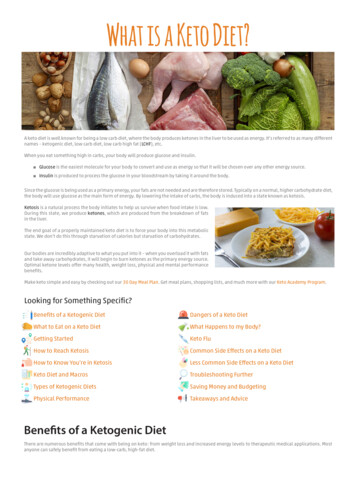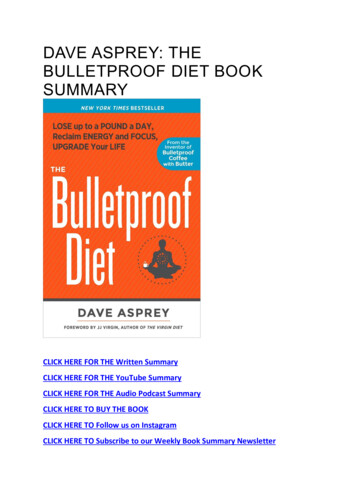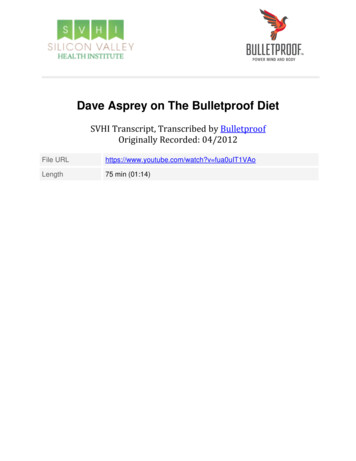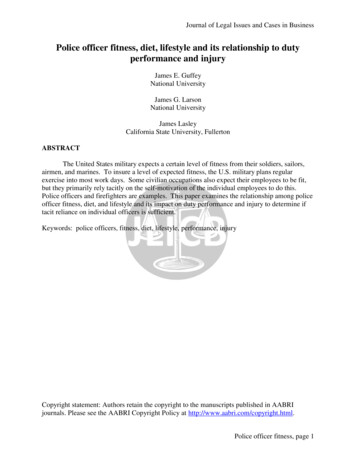
Transcription
Problems of survival (3): Diet and the omnivore’s dilemmaThe human dietIforager vs. chimp dietIcookingIrecent evolutionary changesSolving the omnivore’s dilemmaIsweet and bitter tastesIlearning biases: neophobiaItaste-aversion learningIsocial learningIculture (spices and cuisine)
Man the hunter?
Human forager vs. chimp 9insects212311203004Dietary percentage of foraged foods, from Kaplan et al. 2000
Human forager vs. chimp diets(from Kaplan et al. 2000)
The advantages of cookingChange in digestibility from cooking:Starch sourceWheatOatsBarleyGreen bananaPlantainPotatoPeaRaw71759349549780(from Carmody and Wrangham 2009)Cooked969699971005191% increase34%28%6%96%87%91%14%
Recent changes: Lactase persistenceIevolved in dairy farming communities in central EuropeIfirst evolved about 7500 years agoIevolved independently in Africa and Middle East
Recent changes: Amylase copy numberIIamylase digests starch in saliva, varies by copy numbermore copies means more amylase
The Omnivore’s DilemmaThe human dietIforager vs. chimp dietIcookingIrecent evolutionary changesThe omnivore’s dilemma:Iwhich foods are toxic?Iwhich foods are most nutritious?Ihow can we know?
Solving the omnivore’s dilemma: sweet and bitter tastesInewborns react more positively to sugar solutions than waterImost infants dislike bitter and sour tastesIaround 4 months, infants develop liking for salty tastesreaction of a two-week old baby to taste of sugar and lemon juice
Solving the omnivore’s dilemma: NeophobiaIrats are also food neophobic; eat a small amount at firstIwillingness to try new foods is greatest during the first twoyears
The omnivore’s dilemma: Social learningIyoung rats prefer foods mothers ate when pregnant andnursing
The omnivore’s dilemma: Social learningIyoung rats prefer foods mothers ate when pregnant andnursingIyoung rats forage where adults are foraging
The omnivore’s dilemma: Social learningIyoung rats prefer foods mothers ate when pregnant andnursingIyoung rats forage where adults are foragingIadult rats prefer food if have smelled on breath and body ofother rats
The omnivore’s dilemma: Social learningIyoung rats prefer foods mothers ate when pregnant andnursingIyoung rats forage where adults are foragingIadult rats prefer food if have smelled on breath and body ofother ratsIhowler monkey infants: copy mom when eating leaves, notfruits
The omnivore’s dilemma: Learning in uteroBabies’ intake of carrot-flavored cereal compared to plain cereal(from Mennella et al. 2001)
The omnivore’s dilemma: Social learningIhuman babies more likely to take novel food from mom thanstranger
The omnivore’s dilemma: Social learningIhuman babies more likely to take novel food from mom thanstrangerIhuman babies more likely to take novel food from stranger ifstranger eats first
The omnivore’s dilemma: Social learningIhuman babies more likely to take novel food from mom thanstrangerIhuman babies more likely to take novel food from stranger ifstranger eats firstIhuman babies choose food eaten by actress speaking theirown vs other language
The omnivore’s dilemma: culture(from Sherman and Hash 2001)
SummaryThe human dietIhumans depend more on meat and extracted foods than otherprimatesIhuman diet is more nutrient-denseIhuman foods are hard to acquire (brain evolution?)Icooking is universal, increases available nutrientsIhumans are evolving adaptations to cultural dietary changes
SummaryThe human dietIhumans depend more on meat and extracted foods than otherprimatesIhuman diet is more nutrient-denseIhuman foods are hard to acquire (brain evolution?)Icooking is universal, increases available nutrientsIhumans are evolving adaptations to cultural dietary changesThe omnivore’s dilemma: how to choose safe, nutritiousfoods?Itaste preferences in newbornsIneophobia (especially high among toddlers)Ibabies prefer what mother ate (learning in utero)Ichildren prefer what familiar people eatIcultural traits can be fitness-enhancing (spices)
Solving the omnivore’s dilemma: sweet and bitter tastes I newborns react more positively to sugar solutions than water I most infants dislike bitter and sour tastes I around 4 months, infants develop liking for salty tastes reaction











